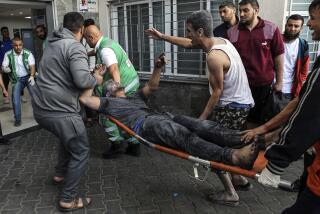How will it end in Afghanistan?
- Share via
This has been one of the worst fortnights in the increasingly unhappy 10 1/2-year Afghan war for NATO and, above all, the United States and its ally, Britain.
First there was the burning of the Korans at Bagram air base, which unleashed a wave of religious fury and revenge killings of U.S. troops. Then came the deaths of six British soldiers, incinerated by a giant Taliban bomb last week, which pushed the British death toll in the war over the symbolic 400 mark. Support in Britain for an increasingly unpopular war further deteriorated. Now comes the shooting in Kandahar of 16 Afghan villagers — many of them women and children — allegedly by a rogue American soldier. All this can only have increased the determination of Prime Minister David Cameron and President Obama, his host for talks in Washington this week, to speed up their exit strategies.
But for the majority of Afghans, distressing as these events are, there are perhaps more pressing concerns. What will happen when the Americans and the rest of NATO pull out?
Afghans already feel that electoral considerations are more important to the West than the key question of whether the raw, new Afghan National Army and the Afghan National Police will be up to the task of guaranteeing the country’s security, especially if Pakistan’sintelligence agency, the ISI, continues to back the Taliban.
Although the U.S.-led surge at the end of 2010 reversed the military balance in the Taliban-infested, drug-rich Kandahar and Helmand provinces, the Taliban has since retaliated by extending its grip in the previously secure north. Now, hardly a week goes by without some prominent government official, police or army chief being ambushed or blown up in Kunduz, Mazar-i-Sharif or even Kabul.
The hemorrhaging IED and suicide-bomb attacks — like the assassination in September of Karzai’s top peace negotiator, former Afghan President Burhanuddin Rabbani, by a supposed peace envoy with a bomb hidden in his turban — has generated a climate of fear and pessimism.
The assassin is said to have been dispatched by the Taliban, who, with its backers, the ISI, are probably the only optimists in Afghanistan. The ISI sees its long-term strategy of manipulating the Taliban insurgency to install a pro-Pakistan government in Kabul as finally paying off.
For this observer, a foreign correspondent for Reuters and Independent Television News for nearly 40 years, the situation conjures up memories of the end of the Vietnam War. National security advisor (and later Secretary of State) Henry Kissinger had to negotiate with his North Vietnamese adversaries from a position of weakness that not even he could disguise. By then all American combat troops were long gone. I watched the North Vietnamese march into Saigon on April 30, 1975; they not only took over the old capital but the whole of the south as well.
Is that what will happen in Afghanistan? Will the Taliban move to fill a vacuum, with Pakistani and ISI backing? One hopes not, and of course it would not happen in one fell swoop as it did in South Vietnam. Many Afghans and non-Afghans fear a Taliban takeover could well lead to civil war. Whatever happens in the Pashtun south and its capital, Kandahar, the Tajik and Uzbek north will almost certainly fight rather than submit to another Taliban dictatorship. Memories of the massacres that accompanied Taliban rule from 1996 until 2001 are still too vivid for any northerner, and many southerners, to want to see the militants back in power.
Ahmed Shah Massoud, the Northern Alliance leader who was assassinated by Al Qaeda suicide bombers two days before9/11, managed to defy the Taliban for five long years despite receiving precious little support from the United States. He left behind plenty of disciples, and many of his old mujahedin commanders are said to be stockpiling arms. One such commander, Masoud’s successor, Marshal Mohammed Qassim Fahim, is Karzai’s senior vice president. Whereas Fahim, reputedly a multimillionaire, could always take refuge abroad, many ordinary former mujahedin would see little option but to stay and fight, no doubt supported by Russia and Iran, which don’t want to see another Taliban government in power in Kabul. Nor do the former Soviet republics to the north.
But short of civil war, is an extremist Islamic state, jeopardizing Western-inspired achievements in education and women’s rights, inevitable? Gen. David Richards, chief of the British defense staff who commanded coalition troops in Afghanistan in 2006-07, does not think so. “I don’t think we are losing, by the way,” he told me. “We are just not succeeding in the time frame that suits and is acceptable to Afghanistan or Afghans and is acceptable to our population and our politicians. So what can we do? Well, since we have only now got the resources to do this correctly, I think we have got to give ourselves more time. People talk about a bit more strategic patience.”
He added: “I believe where we have got the balance right, we are already turning the corner in practical terms.... Which is why, I think, give us a bit longer; 2015 is probably doable, for example. We have just started to get it right, and we might yet succeed.”
But will the politicians give the generals that long? In the light of recent developments, it is doubtful.
Sandy Gall is the author of “War Against the Taliban: Why It All Went Wrong in Afghanistan,” which was published in Britain in January.
More to Read
A cure for the common opinion
Get thought-provoking perspectives with our weekly newsletter.
You may occasionally receive promotional content from the Los Angeles Times.






